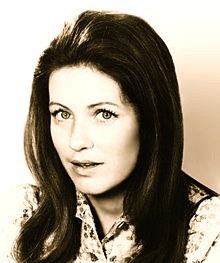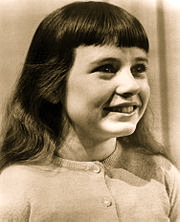Patty Duke

Patty Duke Dead at 69
Patty Duke, Oscar-winning actress and the star of an eponymous TV show, died this morning, ABC News has confirmed.
Anna Marie “Patty” Duke (December 14, 1946 – March 29, 2016) was an American actress of stage, film, and television. She first became known as a teen star, who won an Academy Award for Best Supporting Actress at age 16 for her role as Helen Keller in The Miracle Worker (1962), which she had originated on Broadway. Later she had the lead in the eponymous sitcom The Patty Duke Show. Duke progressed to more mature roles such as in the film Valley of the Dolls (1967), playing Neely O’Hara. She served as the president of the Screen Actors Guild from 1985 to 1988, four years after her Patty Duke Show co-star William Schallert held the same office.
Duke was diagnosed with bipolar disorder in 1982, after which she devoted much of her time as an advocate for and educating the public on mental health issues.
In 1996, 30 years after The Patty Duke Show ended, Duke was ranked No. 40 on TV Guide’s “50 Greatest TV Stars of All Time.”
Early Life
Duke was born in Elmhurst, Queens, New York, the youngest of three children born to Frances (née McMahon), a cashier, and John Brock Duke, a handyman and cab driver. She was of German (from her maternal grandmother) and Irish descent (on both sides, her paternal grandparents, James and Katness (O’Hara) Duke, having immigrated to New York from County Longford, Ireland).
Duke, her brother Raymond, and her sister Carol experienced a tough childhood. Their father was an alcoholic, and their mother suffered from clinical depression and was prone to violence. When Duke was six, her mother threw her father out. When Duke was eight, her care was turned over to talent managers John and Ethel Ross, who, after promoting Patty’s brother, were looking for a girl to add to their stable of child actors.
The Rosses’ methods of managing Duke’s career were often unscrupulous and exploitative. They consistently billed Duke as being two years younger than she actually was and padded her resume with false credits. Ethel Ross gave the sweeping name-change order – “Anna Marie is dead; you’re Patty now.” She hoped that “Patty Duke” would duplicate the success of tween actress Patty McCormack. This act would have painful repercussions for Duke in the future.
Career – Acting – 1950s–1990s
One of Duke’s first acting jobs was in the late 1950s, on the soap opera The Brighter Day. She also appeared in print ads and in television commercials. In 1959, at the age of 12, Duke appeared on The $64,000 Question and won $32,000; her category of expertise was spelling. In 1962, it was revealed that the game show had been rigged, and she was called to testify before a panel of the United States Senate.
In 1959, Duke appeared in a television adaptation of Meet Me in St. Louis as Tootie Smith, the role that had been originated in the film version by Margaret O’Brien.
Duke’s first major starring role was playing Helen Keller (with Anne Bancroft as Annie Sullivan) in the Broadway play The Miracle Worker, which ran for nearly two years (October 1959-July 1961). About midway through the production run, her name was placed above the title on the marquee. The play was subsequently made into a 1962 film, for which Duke received the Academy Award for Best Supporting Actress. At 16, Duke was the youngest person at that time to have received an Academy Award in a competitive category. Duke returned to television, starring with Laurence Olivier and George C. Scott in a television production of The Power and the Glory (1961).
Duke’s own series, The Patty Duke Show, which Sidney Sheldon created especially for her, began in 1963. Sheldon asked Duke to spend a week with his family at their home to generate ideas. At that time, it was not known that Duke had bipolar disorder, but Sheldon did notice that she had two distinct sides to her personality and so developed the concept of identical cousins with contrasting personalities.
Duke portrayed both main characters: Patricia “Patty” Lane, a fun-loving American teenager who occasionally got into minor trouble at school and home, and her “prim and proper” “identical cousin” from Scotland, Catherine “Cathy” Lane. William Schallert portrayed Patty’s father Martin, Jean Byron her mother Natalie, Paul O’Keefe her younger brother Ross, and Eddie Applegate her boyfriend Richard. The show also featured such high-profile guest stars as Sammy Davis, Jr., Peter Lawford, Paul Lynde, and Sal Mineo. The series lasted three seasons and earned Duke an Emmy Award nomination. In 1999, the program’s characters were revisited and updated in The Patty Duke Show: Still Rockin’ In Brooklyn Heights, with Cindy Williams taking on the villain role of Sue Ellen Turner when Kitty Sullivan was unable to reprise her role.
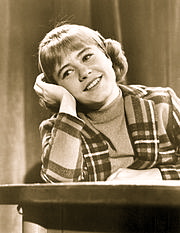 Duke as Patty Lane on The Patty Duke Show, 1965
Duke as Patty Lane on The Patty Duke Show, 1965
Despite her successful career, Duke was deeply miserable during her teenage years. The Rosses made efforts to portray her as a normal teenager, but she later indicated in her memoir Call Me Anna that she was virtually the Rosses’ prisoner, and had little control over her earnings or her life. The Rosses controlled her and her mother by allowing them only a small amount of money to survive on. They also started supplying Duke with alcohol and prescription drugs when she was 13; this, along with her undiagnosed bipolar disorder, contributed to her young-adult substance-abuse problems. As an adult, Duke accused both Rosses of sexual abuse. Upon turning 18, Duke became legally free of the Rosses, only to discover that they had squandered most of her earnings, in violation of the Coogan Act.
After the cancellation of The Patty Duke Show, Duke attempted to leave her childhood success behind and began her adult acting career by playing Neely O’Hara in Valley of the Dolls (1967). The film was a box-office success, but audiences and critics had a difficult time accepting all-American-teenager Duke as an alcoholic, drug-addicted singing star. While the film has since become a camp classic—thanks in large part to Duke’s over-the-top performance —at the time, it almost ruined her career.
Duke starred in Me, Natalie (1969), a film in which she played an “ugly duckling” Brooklyn teenager struggling to make a life for herself in the Bohemian world in Greenwich Village. One of the other performers in the film was Al Pacino making his film debut. The film was a box-office failure, but Duke won the Golden Globe for Best Actress (Musical or Comedy) for the role.
Duke returned to television in 1970, starring in a made-for-TV movie, My Sweet Charlie. Her sensitive portrayal of a pregnant teenager on the run won Duke her first Emmy Award, but her acceptance speech was rambling, angry, and disjointed, and led many in the industry to believe she was drunk or using drugs at the moment. In fact, Duke was in the throes of a manic phase of her bipolar disorder, which would remain undiagnosed until 1982.
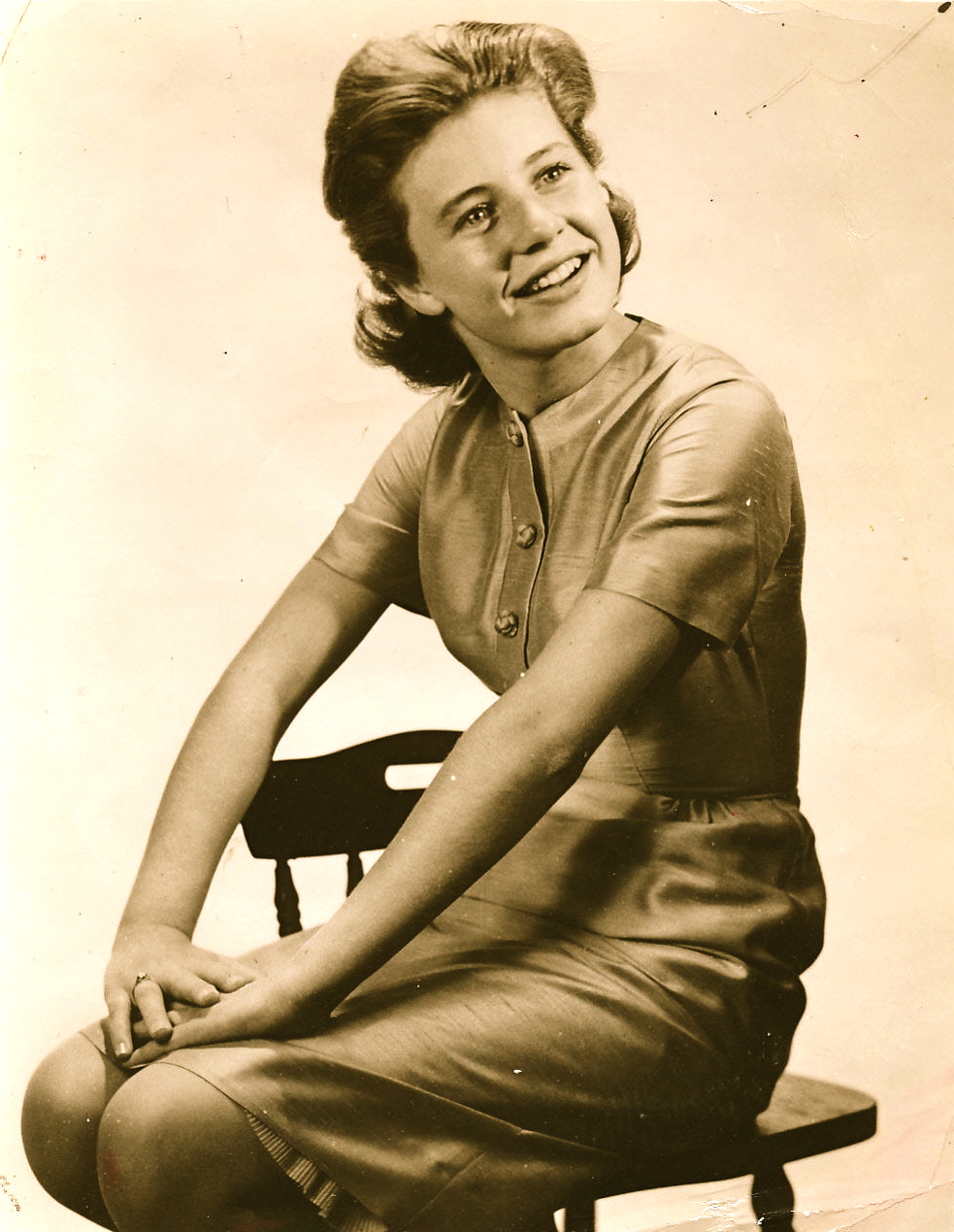 From the mid-1970’s to the early 2000’s, Duke worked primarily in television. Among other TV appearances, she could occasionally be seen as a guest celebrity on the game show Match Game. She received her second Emmy in 1977 for the TV miniseries Captains and the Kings, and her third in 1980 for a TV version of her 1979 stage revival of The Miracle Worker, this time playing Anne Sullivan to Melissa Gilbert’s Helen Keller. Her turns in the made-for-TV movies The Women’s Room (1980) and George Washington (1984) both garnered her Emmy nominations.
From the mid-1970’s to the early 2000’s, Duke worked primarily in television. Among other TV appearances, she could occasionally be seen as a guest celebrity on the game show Match Game. She received her second Emmy in 1977 for the TV miniseries Captains and the Kings, and her third in 1980 for a TV version of her 1979 stage revival of The Miracle Worker, this time playing Anne Sullivan to Melissa Gilbert’s Helen Keller. Her turns in the made-for-TV movies The Women’s Room (1980) and George Washington (1984) both garnered her Emmy nominations.
In 1982, Duke was cast alongside Richard Crenna in the ABC sitcom It Takes Two, from Soap and Benson creator Susan Harris. The socially topical series depicted both Duke’s and Crenna’s characters as a modern career couple (hers was a lawyer, his a surgeon) and the moral and personal challenges that abounded from their professions. Helen Hunt and Anthony Edwards played their teenaged offspring. Although It Takes Two was praised, ABC cancelled the series after one season due to low ratings.
Duke subsequently worked with Susan Harris on a new ABC series, Hail To The Chief, which premiered in April 1985. She appeared as the first female President of the United States in the ensemble, all-star series, which featured, among others, Dick Shawn, Herschel Bernardi, Glynn Turman, and Ted Bessell as Duke’s husband. The material was topical yet off-the-wall, much in the fashion of the previously popular show Soap. Hail To The Chief was less successful than the star’s and producer’s previous joint effort, It Takes Two, and was cancelled after only seven episodes. In 1987, Duke returned to series television in another short-lived comedy, Karen’s Song, which aired on the fledgling Fox network.
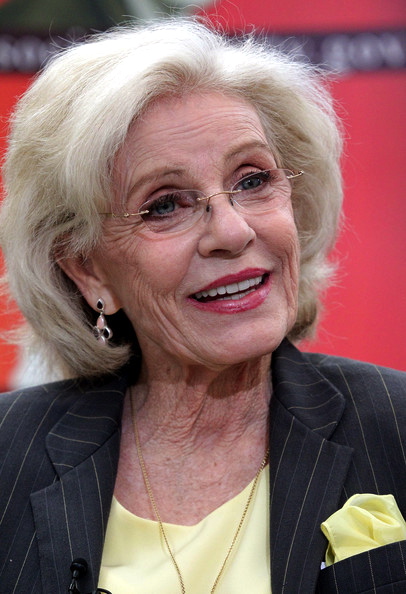 While between series in 1986, Duke starred in the made-for-TV movie A Time to Triumph, the true story of Concetta Hassan, a middle-aged woman who struggles to support her family after her construction worker husband suffers an on-the-job injury, but who eventually becomes a United States Army helicopter pilot. On set, Duke became good friends with Army drill sergeant Michael Pearce, who was a technical advisor for the production; the couple married on March 15, 1986.
While between series in 1986, Duke starred in the made-for-TV movie A Time to Triumph, the true story of Concetta Hassan, a middle-aged woman who struggles to support her family after her construction worker husband suffers an on-the-job injury, but who eventually becomes a United States Army helicopter pilot. On set, Duke became good friends with Army drill sergeant Michael Pearce, who was a technical advisor for the production; the couple married on March 15, 1986.
Duke succeeded Ed Asner as president of the Screen Actors Guild in 1985 and would hold the post until 1988. She was the second woman (actress Kathleen Nolan was the first) to be elected to the position.
In 1990, Duke’s autobiography, Call Me Anna, was adapted for television; she played herself from her mid-30s onward.
Though Duke’s primary medium from the late-1970s to the mid-2000s was television, she continued to take small roles in movies. Her 1982 portrayal of a lesbian fashion designer in the Canadian film By Design garnered her a Genie Award nomination for Best Foreign Actress. Duke portrayed the mother of Meg Ryan’s character in the 1992 film adaptation of the play Prelude to a Kiss. Her appearances in three episodes of Touched by an Angel resulted in an Emmy nomination in 1999.

